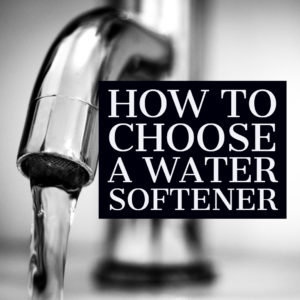How do you choose the best water softener?
 Hard water is all too much of a reality for millions of Americans. In fact, according to the U.S. Geological Survey, 85 percent of American homes have problems with hard water. That means a lot of people are dealing with unnecessary problems while living without a water softener. Even though hard water is less of a health issue than it is a nuisance, life with a water softener will save money and energy all while leaving you more time to spend with your family.
Hard water is all too much of a reality for millions of Americans. In fact, according to the U.S. Geological Survey, 85 percent of American homes have problems with hard water. That means a lot of people are dealing with unnecessary problems while living without a water softener. Even though hard water is less of a health issue than it is a nuisance, life with a water softener will save money and energy all while leaving you more time to spend with your family.
A water softener can help eliminate or lessen problems caused by hard water. But with so many options for brands on models on the market, how will you know which water softener is right for you? You must consider things like the number of people in your home, the size and demands of your household, spacing, quality of water, WQA and other certifications and buying from a reputable business. Water softener reports can help you choose the right size water softener and understand salt-free and dual-tank softeners, and more.
Again, hard water is not necessarily a health concern for households, as hard water comes from aquifers and other underground sources that collect dissolved minerals from rock—particularly calcium, magnesium carbonate, and manganese. The problem with hard water is essentially how difficult it makes chores due to producing soap curd and detergent deposits on fabric, leaving soap scum rings in the bathtub and more. According to one consumer report, many of the problems created by hard water are “hidden until some type of malfunction occurs” in your home’s plumbing system or in a water-using appliance. When heated, dissolved hard-water minerals “recrystallize and form scale that eventually clogs plumbing, reducing water flow.” Scale and lime deposits also take their toll on water-heating appliances such as dishwashers and coffee makers, increasing the need for repairs. The Water Quality Research Council at New Mexico State University found that water heaters operate 22 percent to 30 percent less efficiently when plagued with hard-water scale. These are all things to consider when deciding on installing a home water softener.
Choosing the right water softener is an essential step in the treatment of your water. What a water softener does is trade “hard” minerals in water for “soft” minerals in water. The typical trade is as calcium hard mineral enters a water softener it is traded for sodium soft mineral. We offer a variety of models to meet the needs of all of our customers and one of our technicians can gladly help you choose. Capacity, demand and different types of whole-house water softeners can get confusing for the average consumer. By far the most popular and commonly used type of whole-house water softener is an ion-exchange or “cation exchange” unit, but when doing business with us, we will let you enjoy your water without having to know every detail behind the softening and purification process. We offer user-friendly controls and our products have been awarded certifications. When selecting your water softener, keep in mind that the NSF International is an independent testing organization that tests and certifies water-treatment products. The water industry’s trade organization, the Water Quality Association, also certifies equipment, so look for the WQA Gold Seal.
Each of the criteria above is important to consider. Some models will offer you few of the suggestions and some will offer you many. When you give us a call, you will realize that you can have it all.


